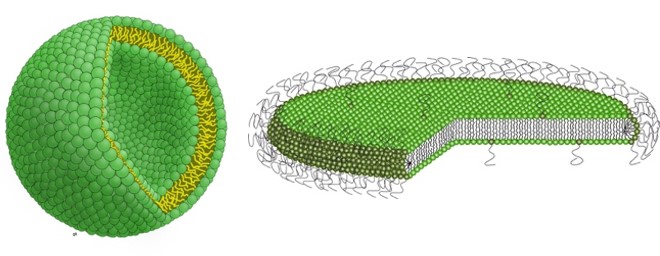Lipodisks for dual delivery of chemothereptuic drugs and anticancer peptides
Prof. Dr. K. Edwards1), Uppsala University/Sweden
People involved
Luís Silva (PhD fellow sponsored by the PRC) - BMC, Uppsala University, Sweden (luis.silva@kemi.uu.se)
Abstract
The overall purpose of the project is to explore the potential of a novel type of lipid-based nanocarriers for formulation and delivery of cancer therapeutic agents. The nanocarriers, referred to as lipodisks, are stable, biocompatible, and very versatile structures.1) Due to their unique properties, the lipodisks are of interest as carriers for several different classes of anticancer agents. Previous studies show that formulation in lipodisks can be used as a viable means to increase tumor accumulation and reduce off-target toxicity of both the anticancer peptide melittin and chemotherapeutic drugs, such as doxorubicin and paclitaxel.2) Recent results from the Edwards lab show that by decorating the lipodisks with ligands that recognize selected cell membrane receptors,3) it is possible to design systems capable of specific tumor cell targeting and true intracellular drug delivery.
In the project, the possibilities to use lipodisks for the co-delivery of chemotherapeutic drugs and membranolytic anticancer peptides will be investigated. The hypothesis is that the membranolytic peptides, apart from being toxic to the cancer cells by themselves, will help sensitize drug resistant cells to the co-administered chemotherapeutic drug. The ambition is that the knowledge gained in the project will contribute to the development of lipodisks as a versatile platform for efficient, safe, and selective delivery of anticancer agents.

Schematic illustration of liposomes (left) and polyethylene glycol (PEG)-stabilized lipodisks (right).
Benefit for the community
The emergence of drug resistance constitutes, together with limitations due to non-specificity and adverse toxic side effects, the major causes for chemotherapeutic treatment failure. To overcome these issues, and reduce cancer-related mortality, new treatment strategies are urgently needed. The project aims to explore a novel strategy to reverse chemoresistance, while at the same time increase the efficiency and reduce the side effects of chemotherapy. If successful, the project will help contribute to the development of safe and effective nanocarrier-based chemotherapies to combat cancer.
Visit the supervisors lab
Optimization of lipodisk properties by modification of the extent and density of the PEG corona
J. Coll. Interf. Sci. 484, 86-96
| PubMed |
Ratiometric co-encapsulation and co-delivery of doxorubicin and paclitaxel by tumor-targeted lipodisks for combination therapy of breast cancer
Int. J. Pharm. 560, 191-204
| PubMed |
EGF-targeting lipodisks for specific delivery of poorly water-soluble anticancer agents to tumour cells
RSC Adv. 7, 22178-22186
| RSC Publishing |
Dual centrifugation as a novel and efficient method for the preparation of lipodisks
International Journal of Pharmaceutics 653, 123894
| PubMed |


